Are there any questions left?
Contact us and we will answer!
COMMON GARBAGE DISPOSAL PROBLEMS AND HOW TO FIX THEM: A GUIDE BY FASTAID
A malfunctioning garbage disposal can be a major inconvenience in any kitchen. It can disrupt your daily routines and lead to unpleasant odors and drainage issues. That's why addressing any problems promptly is essential. FastAid Appliance Repair understands the importance of a well-functioning garbage disposal, and we are dedicated to providing reliable solutions for common garbage disposal problems. With our team of skilled technicians in Charlotte, NC, you can trust us to diagnose and resolve a wide range of garbage disposal issues efficiently and effectively.
In this comprehensive guide, we aim to empower homeowners in Charlotte and surrounding areas with the knowledge and tools to troubleshoot and fix common garbage disposal problems on their own. We understand that not every issue requires professional intervention, and that's why we provide step-by-step troubleshooting and repair tips. Whether you're dealing with a jammed disposal, slow draining, foul odors, strange noises, leaks, or other garbage disposal malfunctions, our guide has you covered.
By following the guidance in this guide, you can save time and money by addressing garbage disposal problems yourself whenever possible. However, if you encounter more complex or challenging issues, the FastAid Appliance Repair team is always ready to assist you. We have the expertise and experience to handle any garbage disposal repair, ensuring that your appliance operates optimally and reliably.
Common Garbage Disposal Problems
Don't let common garbage disposal problems disrupt your kitchen experience. With FastAid Appliance Repair and this comprehensive guide, you can regain control over your garbage disposal's performance and maintain a clean and efficient kitchen. Let's dive into the world of garbage disposal troubleshooting and repairs, empowering you to become a savvy homeowner when it comes to maintaining your appliance.
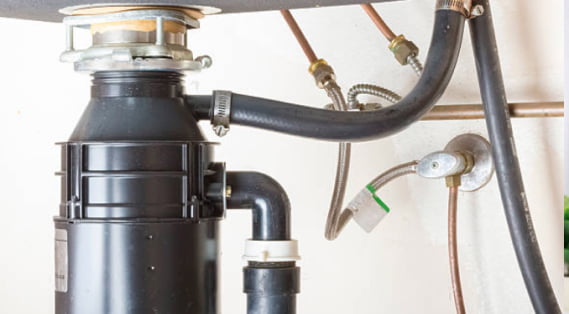
Jammed Garbage Disposal
One of the most common garbage disposal problems is when it gets jammed, preventing proper operation. We'll explore the potential causes, such as foreign objects, excessive food waste, or a malfunctioning flywheel. Our guide will provide step-by-step instructions on how to troubleshoot and fix a jammed garbage disposal to get it working again.
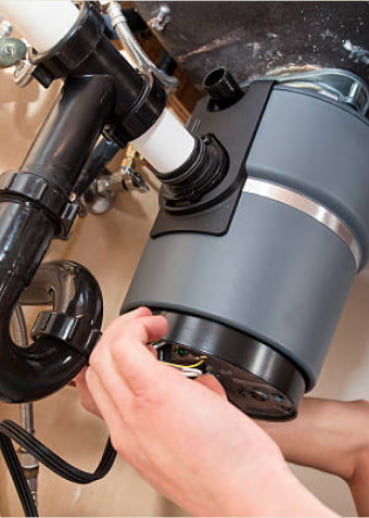
- Turn Off the Power: Before attempting any repairs, make sure the power to the garbage disposal is turned off to avoid accidents.
- Use the Reset Button: Many garbage disposals have a reset button on the bottom. Press it to reset the disposal and attempt to clear the jam.
- Inspect the Disposal: Look inside the garbage disposal to identify any visible obstructions. Use tongs or pliers to remove any foreign objects, such as utensils or large food pieces.
- Use the Wrench: Most garbage disposals come with an Allen wrench. Insert the wrench into the bottom of the disposal and manually rotate the flywheel back and forth to dislodge any stuck objects.
- Clear Built-Up Residue: If the disposal is still jammed, pour a mixture of baking soda and vinegar down the drain to break down any built-up residue. Let it sit for a few minutes before running hot water and turning on the disposal.

Slow Draining Garbage Disposal
A garbage disposal that drains slowly can be frustrating and lead to unpleasant odors. This issue can be caused by clogs, improper usage, or pipe blockages. Our guide will offer practical solutions to troubleshoot and fix slow draining in your garbage disposal.
- Run Cold Water: Always run cold water while using the garbage disposal and for a few seconds afterward. Cold water helps solidify fats and grease, reducing the risk of clogs.
- Avoid Hard Foods and Fibrous Items: Do not put hard items like bones or fibrous foods like celery or potato peels into the disposal, as they can cause clogs.
- Clear Blockages: If the disposal is draining slowly, there may be a clog in the pipes. Try using a plunger or a drain snake to clear the blockage.
- Use a Drain Cleaner: You can use a safe and eco-friendly drain cleaner to break down any organic matter causing the slow draining. Follow the instructions on the product's label.
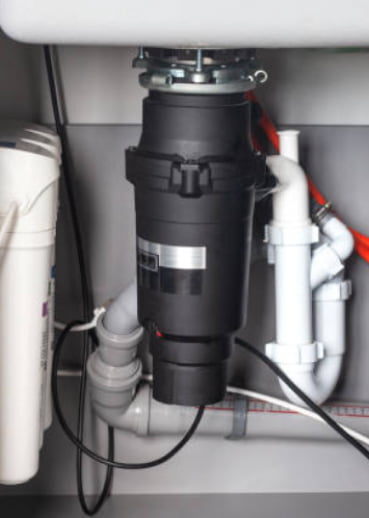
Foul Odors from the Garbage Disposal
Unpleasant odors emanating from the garbage disposal can make the entire kitchen smell bad. These odors can be due to food residue or bacterial growth. Our guide will provide tips on how to eliminate foul odors and keep your garbage disposal smelling fresh.
- Run Cold Water: Running cold water while using the disposal helps flush away food particles and prevents the buildup of odor-causing residues.
- Use Lemon or Citrus Peels: Drop a few lemon or citrus peels into the disposal and run it with cold water to help freshen the unit and eliminate odors.
- Baking Soda and Vinegar: Sprinkle baking soda down the drain and pour a cup of vinegar into the disposal. Let the mixture sit for a few minutes before running cold water and turning on the disposal.
- Ice Cubes: Drop a few ice cubes into the disposal and run it to help remove food residues and keep the blades clean.
- Clean the Rubber Flaps: Regularly clean the rubber flaps or splash guard to remove any food residues that may be causing odors.
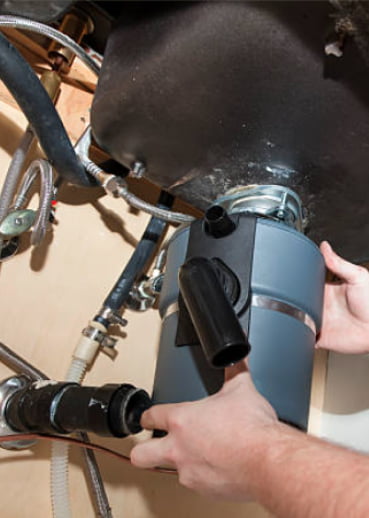
Strange Noises from the Garbage Disposal
Strange noises coming from the garbage disposal can be disconcerting. These noises may be due to a loose component, damaged flywheel, or worn-out motor. Our guide will help you identify the source of the noise and provide steps to address the issue.
- Turn Off the Power: Before inspecting the disposal, turn off the power to avoid any accidents.
- Inspect for Foreign Objects: Look inside the disposal for any visible foreign objects that may be causing the noise. Use tongs or pliers to remove them.
- Tighten Components: Check for any loose components, such as mounting bolts or screws, and tighten them to eliminate rattling noises.
- Clear the Flywheel: If the flywheel is damaged or obstructed, remove any foreign objects and use the wrench to manually rotate it to dislodge any stuck items.
- Seek Professional Help: If the noise persists or you're uncertain about its source, contact a professional technician. They can accurately diagnose the problem and provide necessary repairs or guidance.
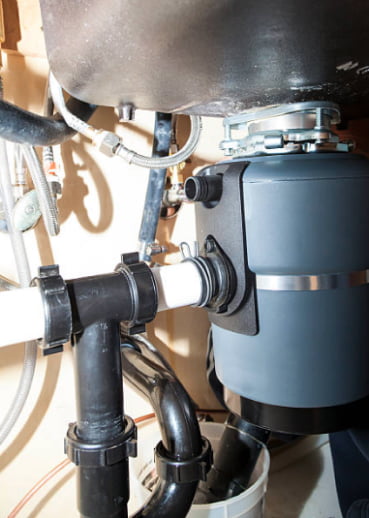
Leaking Garbage Disposal
A leaking garbage disposal can create water damage and lead to more significant problems if not addressed promptly. Leaks can be caused by loose connections, damaged seals, or cracked components. Our guide will help you identify and fix the source of the leak to prevent further damage
- Turn Off the Power: Before attempting any repairs, turn off the power to the garbage disposal to ensure safety.
- Check Connections: Inspect all connections, including the drainpipe and dishwasher connection, for any leaks. Tighten any loose connections.
- Replace Seals: If the disposal is leaking from the bottom, the internal seals may be worn out. Contact a professional technician to replace the seals.
- Inspect the Drain Gasket: The drain gasket may be damaged or worn out, causing leaks. Remove the disposal and replace the gasket if necessary.
- Check for Cracks: Inspect the disposal's housing and components for any cracks or damage. A cracked disposal may need to be replaced.
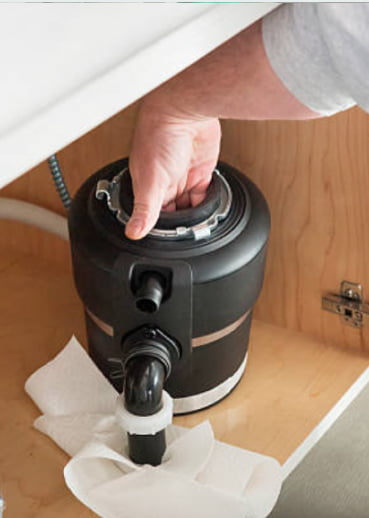
Garbage Disposal Not Turning On
If your garbage disposal fails to turn on, it may be due to electrical issues, a faulty switch, or a motor problem. Our guide will help you troubleshoot and identify the cause of the problem to get your disposal up and running again.
- Check the Power: Ensure that the garbage disposal is plugged in and that the power outlet is working. Test the outlet with another appliance to verify its functionality.
- Reset the Disposal: Many disposals have a reset button on the bottom. Press it to reset the unit and try turning it on again.
- Inspect the Switch: If the disposal is still not turning on, the wall switch or the disposal's switch may be faulty. Test the switch with a multimeter and replace it if necessary.
- Check the Motor: If the disposal is getting power but still not turning on, the motor may be burnt out. Contact a professional technician to replace the motor.
- Seek Professional Help: If troubleshooting steps fail or further repairs are needed, contact a professional technician.
Professional Garbage Disposal Repair in Charlotte, NC
By following the troubleshooting tips and repair techniques provided in this guide, homeowners in Charlotte and surrounding areas can address common garbage disposal problems and ensure the proper functioning of their appliances. FastAid Appliance Repair is committed to assisting customers in Charlotte, NC, with their garbage disposal repair needs, providing fast and reliable service to ensure a clean and efficient kitchen.
For professional assistance with garbage disposal repairs in Charlotte, NC, contact FastAid Appliance Repair today. Our skilled appliance repair technicians are ready to diagnose and resolve any garbage disposal issue you may encounter. Trust us to keep your garbage disposal running optimally and reliably.
Garbage Disposal Problems FAQs
While garbage disposals can handle most food waste, avoid putting in hard items like bones, fruit pits, or fibrous foods like celery or potato peels. Also, refrain from pouring fats, oils, and grease down the disposal, as they can lead to clogs and odors.
A humming noise without the disposal working could indicate a jam or a faulty motor. Follow the steps in our guide to troubleshoot the jam, and if the problem persists, contact a professional technician to inspect and repair the disposal.
While some homeowners may have the skills to install a garbage disposal, it's best to have it installed by a professional. Improper installation can lead to leaks and other issues.
Cleaning your garbage disposal regularly is essential to prevent foul odors and maintain its efficiency. Use a mixture of baking soda and vinegar or drop lemon peels and ice cubes into the disposal while running cold water to keep it clean and fresh.